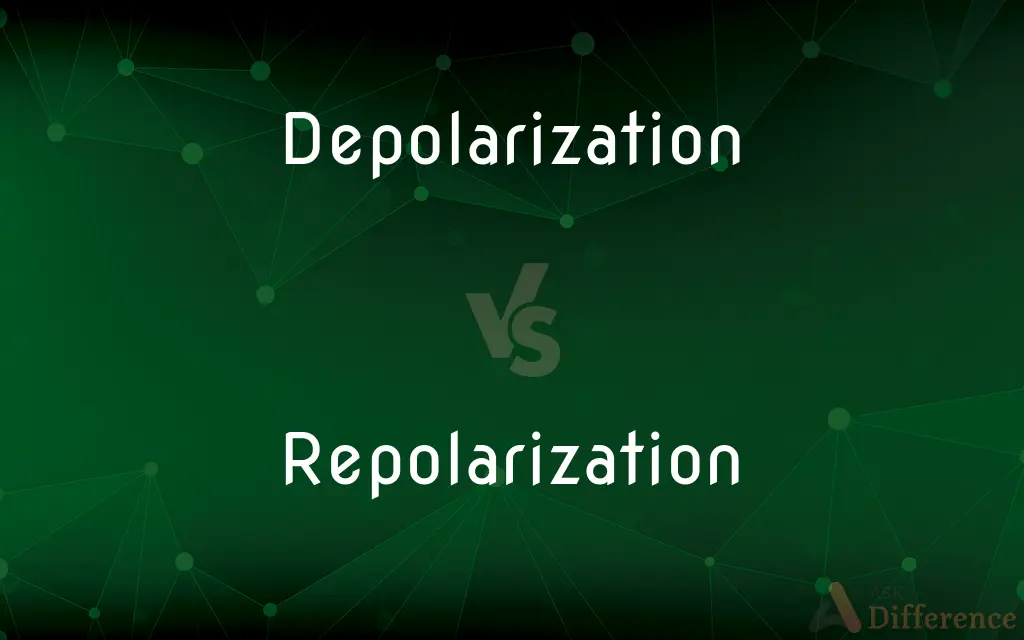Depolarization vs. Repolarization — What's the Difference?
By Tayyaba Rehman — Updated on September 20, 2023
Depolarization is the phase when a cell's membrane potential becomes less negative, while repolarization restores it to its resting negative state.

Difference Between Depolarization and Repolarization
Table of Contents
ADVERTISEMENT
Key Differences
In the realm of physiology, particularly concerning nerve and muscle cells, Depolarization and Repolarization are pivotal phases of action potential. Depolarization refers to the initial change in a cell's membrane potential, making it less negative, moving towards zero. It signifies the moment when positive ions rush into the cell, primarily due to sodium ion influx.
Contrastingly, Repolarization is the process that follows, reverting the membrane potential back to its original, negative resting state. This happens because of the outflow of positive potassium ions from the cell. Essentially, after the surge of activity during Depolarization, Repolarization acts as the calming and resetting phase, readying the cell for subsequent action potentials.
The dance between Depolarization and Repolarization is crucial for the transmission of electrical impulses, especially in neurons and cardiac muscles. While Depolarization ignites the spark, signifying the start of the electrical impulse, Repolarization ensures the cell returns to a state of readiness for the next wave of electrical activity.
Both processes, Depolarization and Repolarization, are essential for maintaining the rhythmic and regulated function of heartbeats and neural transmissions. Without the harmonious transition between these phases, our nervous system and heart would fail to function optimally.
Comparison Chart
Definition
Initial change making potential less negative.
Returns potential to negative resting state.
ADVERTISEMENT
Ions involved
Primarily Sodium (Na+).
Primarily Potassium (K+).
Membrane potential direction
Towards zero (becomes less negative).
Returns to resting state (more negative).
Sequence in action potential
Occurs first.
Follows after Depolarization.
Function
Initiates electrical impulse.
Resets the cell for future impulses.
Compare with Definitions
Depolarization
A decrease in membrane potential difference.
Depolarization causes the neuron's inside to become more positive.
Repolarization
The return of a cell's membrane potential to its resting state.
After the impulse, Repolarization resets the neuron.
Depolarization
Initiation phase of an action potential.
The rapid Depolarization marks the start of the nerve impulse.
Repolarization
Essential for rhythmic functions like heartbeats.
Irregular Repolarization can disrupt normal heart rhythms.
Depolarization
A shift from the resting potential towards zero.
Depolarization shifts the membrane potential towards a less negative value.
Repolarization
Phase following depolarization in action potential.
Repolarization ensures the cell can fire another impulse later.
Depolarization
Result of sodium ion influx in neurons.
During Depolarization, sodium channels open, allowing Na+ to enter.
Repolarization
Characterized by the efflux of potassium ions.
During Repolarization, potassium ions exit the cell, restoring negativity.
Depolarization
Opposite of hyperpolarization.
A stimulus triggers Depolarization, reversing hyperpolarized state.
Repolarization
Restoration of the negative internal charge of a cell.
The cell's interior becomes negative again during Repolarization.
Depolarization
In biology, depolarization (British English: Depolarisation) is a change within a cell, during which the cell undergoes a shift in electric charge distribution, resulting in less negative charge inside the cell. Depolarization is essential to the function of many cells, communication between cells, and the overall physiology of an organism.
Repolarization
In neuroscience, repolarization refers to the change in membrane potential that returns it to a negative value just after the depolarization phase of an action potential which has changed the membrane potential to a positive value. The repolarization phase usually returns the membrane potential back to the resting membrane potential.
Depolarization
To partially or completely eliminate or counteract the polarization of.
Repolarization
The restoration of a polarized state across a membrane, as in a muscle fiber following contraction.
Depolarization
To remove magnetic properties from; demagnetize.
Repolarization
The act of repolarizing.
Depolarization
The act of reducing polarity, or the result of such action; reduction to an unpolarized or less polarized condition.
Depolarization
An intracellular shift in electrical charge distribution, resulting in less negative charge inside the cell compared with outside; it is essential to the function of many cells, communication between cells, and the overall physiology of an organism.
Depolarization
(sociology) Reduction of political polarization.
Depolarization
The act of depriving of polarity, or the result of such action; reduction to an unpolarized condition.
Depolarization
A loss of polarity or polarization
Common Curiosities
When does Repolarization occur in action potential?
Repolarization follows Depolarization during the descending phase of action potential.
How is Depolarization related to action potential?
Depolarization initiates the action potential by making the cell's interior more positive.
What is the main ion involved in Depolarization?
Sodium (Na+) is the primary ion involved in Depolarization.
Does Repolarization involve sodium?
While Repolarization primarily involves the efflux of potassium, sodium channels close during this phase.
What might disrupt Depolarization?
Toxins, specific medications, or ion channel mutations can disrupt Depolarization.
Is Repolarization the final phase of action potential?
No, after Repolarization, there's often a hyperpolarization phase before returning to resting state.
Why is Repolarization essential?
Repolarization resets the cell to its resting state, readying it for another impulse.
Can irregular Repolarization affect the heart?
Yes, irregular Repolarization can lead to cardiac arrhythmias.
What triggers Depolarization?
Depolarization is often triggered by a stimulus causing sodium channels to open.
Why does Depolarization make the inside of a cell more positive?
Depolarization allows positively charged sodium ions to rush into the cell.
Does Depolarization always lead to action potential?
Not always. If Depolarization doesn't reach the threshold, an action potential won't be generated.
What happens if Depolarization doesn't occur?
Without Depolarization, the action potential won't initiate, impacting nerve and muscle functions.
How long does Repolarization last?
The duration of Repolarization can vary but is typically quick, lasting milliseconds.
Is Depolarization a passive process?
No, Depolarization is an active process driven by ion channel activities.
How can Repolarization be measured?
Repolarization can be observed in ECG tracings as the T wave.
Share Your Discovery

Previous Comparison
Pastor vs. Reverend
Next Comparison
Assurance vs. InsuranceAuthor Spotlight
Written by
Tayyaba RehmanTayyaba Rehman is a distinguished writer, currently serving as a primary contributor to askdifference.com. As a researcher in semantics and etymology, Tayyaba's passion for the complexity of languages and their distinctions has found a perfect home on the platform. Tayyaba delves into the intricacies of language, distinguishing between commonly confused words and phrases, thereby providing clarity for readers worldwide.















































